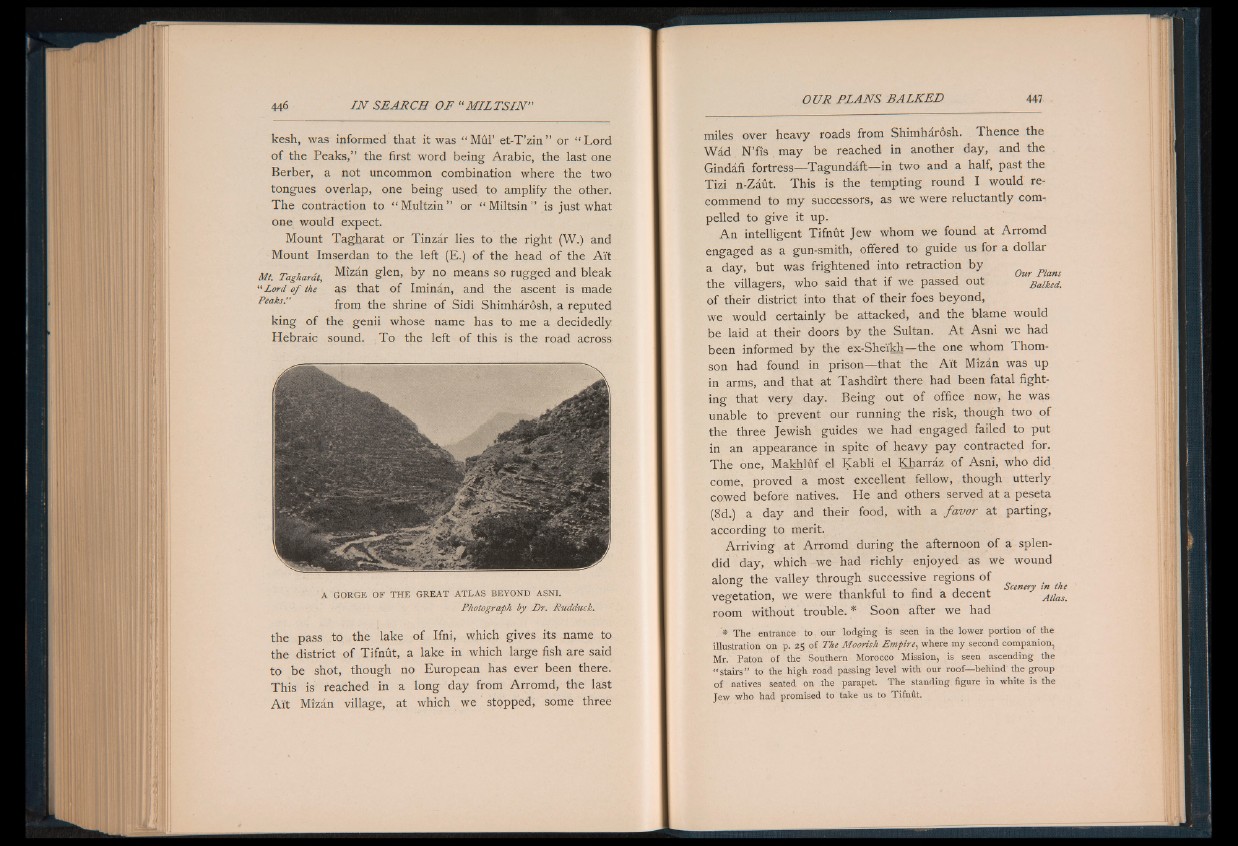
kesh, was informed that it was “ Mul* et-T’z in” or “ Lord
of the Peaks,” the first word being Arabic, the last one
Berber, a not uncommon combination where the two
tongues overlap, one being used to amplify the other.
The contraction to “ Multzin” or “ Miltsin ” is just what
one would expect.
Mount Tagharat or Tinzar lies to the right (W.) and
Mount Imserdan to the left (E.) of the head of the Ait
Mt Tagharat Mizan glen, by no means so rugged and bleak
“ Lord o f the as that of Iminan, and the ascent is made
Peaks. from the shrine of Sidi Shimharosh, a reputed
king of the genii whose name has to me a decidedly
Hebraic sound. To the left of this is the road across
A GORGE OF THE GREAT ATLAS BEYOND ASNI.
Photograph by Dr. Rudduck.
the pass to the lake of Ifni, which gives its name to
the district of Tifnut, a lake in which large fish are said
to be shot, though no European has ever been there.
This is reached in a long day from Arromd, the last
Ai't Mizan village, at which we stopped, some three
OUR PLANS BALKED 447
miles over heavy roads from Shimharosh. Thence the
Wad N’fis may be reached in another day, and the
Gindafi fortress— Tagundaft— in two and a half, past the
Tizi n-Zaut. This is the tempting round I would recommend
to my successors, as we were reluctantly compelled
to give it up.
A n intelligent Tifnut Jew whom we found at Arromd
engaged as a gun-smith, offered to guide us for a dollar
a day, but was frightened into retraction by 0ur Plans
the villagers, who said that if we passed out Balked.
of their district into that o f their foes beyond,
we would certainly be attacked, and the blame would
be laid at their doors by the Sultan. A t Asni we had
been informed by the ex-Sheikh— the one whom Thomson
had found in prison— that the A it Mizan was up
in arms, and that at Tashdirt there had been fatal fighting
that very day. Being out of office now, he was
unable to prevent our running the risk, though two of
the three Jewish guides we had engaged failed to put
in an appearance in spite of heavy pay contracted for.
The one, Makhluf el Kabli el Kharraz of Asni, who did
come, proved a most excellent fellow, though utterly
cowed before natives. He and others served at a peseta
(8d.) a day and their food, with a fa v o r at parting,
according to merit.
Arriving at Arromd during the afternoon of a splendid
day, which we had richly enjoyed as wfe wound
alone the valley through successive regions of
i r 1 ■ r j j j. Scenery m the
vegetation, we were thankful to find a decent Atlas.
room without trouble. * Soon after we had
* The entrance to our lodging is seen in the lower portion of the
illustration on p. 25 of The Moorish Empire, where my second companion,
Mr. Paton of the Southern Morocco Mission, is seen ascending the
“ stairs” to the high road passing level with our roof— behind the group
of natives seated on the parapet. The standing figure in white is the
Jew who had promised to take us to Tifntlt.